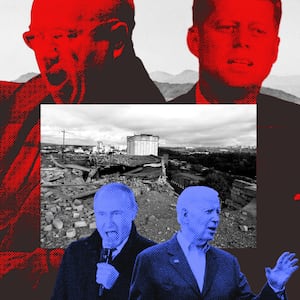Former Pink Floyd frontman Roger Waters spoke (via video) to the United Nations yesterday, calling for a ceasefire in Ukraine. I agree with that message. And for whatever it’s worth, I’m a massive Pink Floyd fan. I wanted to love the speech.
But my heart sank when I heard Waters blandly refer to the “Russian Federation” while calling Ukraine’s government “the Kyiv Regime.” And the ugly and absurd fact hovering over his otherwise moving speech was that he was speaking at the invitation of Russia—the party that started the war in the first place.
As a matter of pragmatism, Roger Waters is doing peace advocates no favors. He’s just making it easier for western hawks to smear anyone who calls for de-escalation and diplomacy as a “Putin apologist.” And as a matter of morality, blurring the line between a genuine anti-war position and support for the Russian side of the conflict is a giant middle finger to the people who most deserve our support—the brave and persecuted anti-war movement within Russia itself.
The Spiral of Escalation
The war started a year ago this month. During the time since, the dial of escalation has only been turned up and up. Every day, dead Ukrainian civilians and dead Russian and Ukrainian soldiers arrive in morgues. Every day, living but dismembered bodies arrive in hospitals.
Russian men have fled to neighboring countries to avoid being pressed into service in an unjust war—and have often been sent back by local authorities. Tit-for-tat western and Russian sanctions have fueled a global food crisis that impacts desperate people in distant countries with no connection to either side of the war. And hovering over all of it is the unlikely but terrifying prospect of America’s proxy war with Russia becoming a direct war between the two nuclear-armed powers.
Each new escalation in the level of U.S. involvement in the conflict takes us across lines that were once thought to be uncrossable. In the early phases of the war, leaks about U.S. intelligence aiding in operations to sink Russian ships and assassinate Russian generals were enough to make any rational observer worry about the spiral of escalation. But, at least in those cases, we were just talking about intelligence aid to operations carried out by Ukrainians.

Pink Floyd co-founder Roger Waters is seen speaking on a video screen during a U.N. Security Council meeting on Ukraine at the United Nations headquarters in New York City, U.S., February 8, 2023.
REUTERS/Shannon StapletonBy December, reports emerged of the intelligence service of an unnamed NATO ally carrying out sabotage operations within Russia itself—with “command and control” belonging to the CIA.
In February, the U.S. was sending Ukraine plenty of arms—but the Biden administration ruled out heavier weaponry as too escalatory. By April, they’d blown past that self-imposed line. About a month after that, Branko Marcetic wrote in Responsible Statecraft, the administration “was sending advanced rocket systems that just weeks earlier it had considered too escalatory, on the strict condition that Ukraine didn’t use them to strike inside Russian territory, something they feared could spark escalation drawing in NATO—until that line too, was eventually breached.”
Back in October, Ukraine’s Minister of Defense told The New Yorker that before the invasion, when he went to D.C. and “asked for 155-millimeter guns, the answer was no.” The same for various other kinds of heavier weapons systems he’d asked for. “Now all of that is a yes.” Therefore, he reasonably predicted, “tomorrow there will be tanks and ATACMS [the Army Tactical Missile System] and F-16s.”
By late January, his prediction seemed to be coming true about the tanks. Oh, and Ukrainian soldiers are on U.S. soil being trained to use U.S. Patriot missiles.
The Case for Diplomacy
None of this means that the conflict will necessarily escalate to a direct military confrontation between the U.S. and Russia, or even that there’s a particularly large chance of that happening.
But imagine you had some horrific negative equivalent of a lottery ticket, where your prize was that everyone you’d ever known or loved would be wiped out by a global thermonuclear exchange. Even if the chances of that happening were as low as the chances of your winning the Powerball jackpot, the possibility would have you waking up every night in a cold sweat. And even if you think the probability of a U.S./Russia war is that low, every new escalatory development makes it just a little bit higher.
Putting this together with the consequences for global food and fuel supplies—and the immense amount of suffering and death happening in Ukraine itself—and there’s a strong case for U.S. intervention of a different sort. That is to say, the U.S. can do what it’s done in conflicts from Northern Ireland to Israel/Palestine, and use its power and influence to nudge both sides toward a diplomatic resolution.
We’re often told that the U.S. taking any initiative toward that end would violate Ukrainian autonomy. Even apart from the fact that such autonomy is reserved for a few decision-makers in a government that Freedom House ranks as slightly less democratic than Victor Orban’s Hungary, though, there’s something fundamentally absurd about the idea that the United States can pour an ocean of money and armaments into a conflict, and that its intelligence forces can play an increasingly direct role in the fighting, but that U.S. involvement in making peace would be meddling.
In the first phase of the war, it could be argued with at least some plausibility that this level of U.S. involvement was necessary to stave off total Russian victory and Moscow-imposed regime change in Kyiv—which would undeniably have been a horrifying outcome. This assumes that Sen. Bernie Sanders, for example, was wrong to argue at the time that a diplomatic push could have prevented the invasion from happening at all. And that former Israeli Prime Minister Naftali Bennett is wrong in his recent assessment that both sides were close to a peace deal in the early months of the war that was blocked by the refusal of Ukraine’s NATO backers to sign off.

Russian Ambassador to the U.N. Vasily Nebenzya listens to Pink Floyd co-founder Roger Waters speak on a video monitor during a U.N. Security Council meeting on February 8, 2023.
REUTERS/Shannon StapletonI suppose we’ll never know. Either way, after the initial Russian offensive was blocked, regime change was off the table and Russia narrowed its war goals. Why wasn’t peace on the table then?
Early in the war, it was often argued that U.S. involvement was necessary, not to guarantee eventual Ukrainian victory in a bloody years-long war, but simply to force Russia to the bargaining table and put the Ukrainians in a better negotiating position when that day came.
Now that the Ukrainians are in that vastly better negotiating position, we’re often told that asking them to negotiate at all is the height of imperial arrogance and that they have a sacred right to fight with U.S. assistance to reclaim every scrap of disputed territory—even Crimea, a territory with a largely Russian-aligned population, considered to be part of Russia even by many Russians who hate Putin, and which Russia might in the last resort use “tactical” nuclear weapons to defend.
In general, the formula seems to be that if Russia is winning, Ukraine must be unconditionally supported with no talk of a ceasefire to put them in a better bargaining position for future negotiations. If Ukraine is winning, only a Putin apologist eager to prevent further wins would want to halt the march toward victory with a ceasefire and peace negotiations.
All this adds up to something like the Red Queen’s rule about jam in Alice in Wonderland. “The rule is, always jam yesterday and jam tomorrow. Never jam today.”
Roger Waters is a Gift to Hawks
There are few rational arguments against de-escalation, but the consideration with the most emotional power is that any sort of mutual compromise would be outrageous because, after all, Russia started it. And the thing is, they did.
Whatever Russia’s points of contention with Ukraine and its western backers over the possibility of Ukrainian NATO membership—which has been a stated concern of every Russian leader from former Soviet leader Mikhail Gorbachev onward—or the conflict between the Ukrainian government and Russian-backed separatists in the Donbas, directly sending Russian troops to try to invade the entire country was an insane escalation.
Even in terms of Russian self-interest, it was wildly counterproductive, and on moral and legal levels—as Roger Waters acknowledged in an impatient and cursory way over the course of two sentences of his sixteen-minute speech at the U.N.—it was indefensible.
It’s true, as Russia’s few defenders in the West often point out, that under roughly parallel circumstances involving a civil war in Mexico and possible Mexican membership in the Warsaw Pact, the U.S. might well have done what Russia did. Given the history of the U.S. treating Latin America as its “sphere of influence,” I can imagine that happening.
But speaking for myself, in any such scenario I would be marching in anti-war protests. And many Russians have done exactly that, in circumstances where taking such a stand involves far vastly more risk than similar protests do in the United States.
Western anti-interventionists can’t do much to support their counterparts in Russia, but the very least we owe them is our sympathy. When Waters says in interviews that Russia’s action was “probably the most provoked invasion ever” or when he calls reports of Russian war crimes supported by the evidence “lies, lies, lies, lies,” he’s siding with the warmongers and spitting in the faces of every brave Russian risking beatings or arrest by protesting Putin’s war.

A member of the 3rd Separate Assault Brigade (Azov Unit) of the Armed Forces of Ukraine prepares to fire 152 mm howitzer 2A65 Msta-B, amid Russia's attack on Ukraine, near Bahmut, in Donetsk region, Ukraine, February 6, 2023.
REUTERS/Marko DjuricaHawks aren’t wrong when they point out that if Putin wanted to unilaterally withdraw from all Ukrainian territory and face the domestic political consequences, he could do so. But they are wrong to treat this as the beginning and end of any discussion of de-escalation. The party that started the war is always at the table in peace negotiations, hammering out a messy compromise that falls short of total justice.
That’s what peace negotiations are—everywhere and always. Otherwise, they wouldn’t be necessary.
The overwhelming cultural dominance of World War II as the only analogy we ever use to talk about any war makes this harder to see. World War II was a (relatively historically rare) case where total victory by one side was both possible and unambiguously the best outcome. A far more instructive analogy for the war in Ukraine would be World War I—a complicated regional conflict in danger of going global because of wide-ranging military alliances.
I think it’s possible to win this argument—but only if we’re very clear on what doves aren’t saying. The anti-war movement 20 years ago could acknowledge that Al Qaeda’s attack on New York City was indefensible and that Saddam Hussein was an evil dictator without supporting the invasions of Afghanistan and Iraq. (But really: Can you imagine Noam Chomsky showing up at the U.N. in March 2003 to give a speech at the invitation of Saddam Hussein’s government?)
Similarly, it should be possible now to mentally walk and chew bubblegum by calling for de-escalation and diplomacy without evincing any sympathy for the other side’s war effort. That’s the right stance to take morally, and it’s also a practical necessity if doves are going to build public support for their position.
So when I see Roger Waters speak at the invitation of the government that started the war, and I see the absurd spectacle of Russia’s Deputy U.N. Ambassador, Dmitry Polyanskiy—a man whose job is to justify Putin’s decision to plunge the world into this mess in the first place—praise Waters as “anti-war,” I get very angry, because the whole stupid spectacle is an insult to genuinely anti-war voices and a gift to the hawks, served up on a silver platter with whatever’s left of Waters’ rock-god glamor as a garnish.
We desperately need a credible push for peace. The antics of Roger Waters are just one more barrier to that happening—another brick in the wall.








